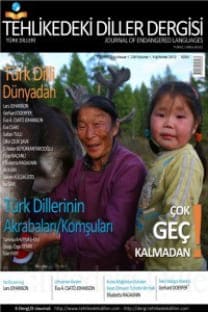YUNANİSTAN GAGAUZLARININ DİLBİLİMSEL KİMLİKLERİ VE HALK TÜRKÜLERİ ÜZERİNE
A This article focuses on one of the least studied groups of Gagauz–the Gagauz of Greece. The study is based on field work the author conducted in 2004. Attached to the article are the lyricsof 25 songs recorded in Greece in the cities of Orestiada and Zihna. On the basis of the field work data the article attempts at carving out the characteristics in vocabulary and pronunciation.The author determined that the members of this Gagauz group identify themselves with the Greeks (Urum), and call their language Türkçä ‘Turkish’ and only rarely Gagauz Türkçesi ‘GagauzTurkish’. However, they differentiate their language (Gagauz) and the Turkish of Turkey, which is called Aslı Türkçä ‘real Turkish’.The article analyzes the causes of the rapid erosion of the Gagauz language in Greece. According to the author, this is not only the loss of its functional significance, but also the marginal relationto their language. The language is perceived as imposed on them by the conquerors (the Ottomans). A similar attitude to their language is to some extent also characteristic for theGagauz of Bulgaria. The Gagauz of Moldova, however, do not share this perception, because after moving to Bessarabia contacts with the Turks stopped and the language has become one of themost powerful factors that influenced the growth of their ethnic identity.
ON THE LINGUISTIC IDENTITY OF THE GAGAUZ OF GREECE AND THEIR FOLK SONGS
A This article focuses on one of the least studied groups of Gagauz–the Gagauz of Greece. The study is based on field work the author conducted in 2004. Attached to the article are the lyricsof 25 songs recorded in Greece in the cities of Orestiada and Zihna. On the basis of the field work data the article attempts at carving out the characteristics in vocabulary and pronunciation.The author determined that the members of this Gagauz group identify themselves with the Greeks (Urum), and call their language Türkçä ‘Turkish’ and only rarely Gagauz Türkçesi ‘GagauzTurkish’. However, they differentiate their language (Gagauz) and the Turkish of Turkey, which is called Aslı Türkçä ‘real Turkish’.The article analyzes the causes of the rapid erosion of the Gagauz language in Greece. According to the author, this is not only the loss of its functional significance, but also the marginal relationto their language. The language is perceived as imposed on them by the conquerors (the Ottomans). A similar attitude to their language is to some extent also characteristic for theGagauz of Bulgaria. The Gagauz of Moldova, however, do not share this perception, because after moving to Bessarabia contacts with the Turks stopped and the language has become one of themost powerful factors that influenced the growth of their ethnic identity.
- Başlangıç: 2012
- Yayıncı: Ülkü ÇELİK ŞAVK
Sayıdaki Diğer Makaleler
BİR GAGAUZ ANNENİN İZLENİMLERİ ‘ANA DİLİMİZ VE BİZ’
BÜÜNKÜ GAGAUZ DİLİ HEM DİN TEKSTLERİNİN ÇEVİRİLERİ
Marcel Erdal, Irina Nevskaya, Ayana Ozonova, Monika Rind Pawlowski, Hans Nugteren
GAGAUZ GENÇLERİN GAGAUZCA VE RUSÇAYA KARŞI DİL TUTUMLARI
YUNANİSTAN GAGAUZLARININ PERİ MASALLARININ ÖZELLİKLERİ ÜZERİNE
